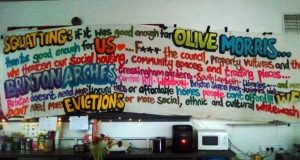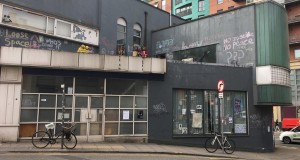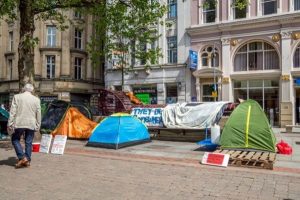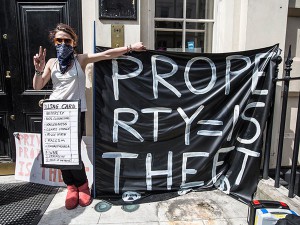 In recent decades squatting has been under near constant assault from a variety of ruling class actors. In 2012 the Conservative/ Liberal Democrat government banned squatting in residential properties for the purposes of living. Councils, Conservative and Labour alike, treat squatters as a public health issues and pressure property owners to fast track evictions. The (still) rising property market in London and other major cities has incentivised owners to use underhand legal techniques and increasingly violent tactics to rid their properties of squatters in order to make a quick sale or proceed with redevelopment works.
In recent decades squatting has been under near constant assault from a variety of ruling class actors. In 2012 the Conservative/ Liberal Democrat government banned squatting in residential properties for the purposes of living. Councils, Conservative and Labour alike, treat squatters as a public health issues and pressure property owners to fast track evictions. The (still) rising property market in London and other major cities has incentivised owners to use underhand legal techniques and increasingly violent tactics to rid their properties of squatters in order to make a quick sale or proceed with redevelopment works.
In spite of this, squatting continues. A Houses of Parliament report on evicting squatters estimated there to be around 20,000 squatters at any one time in the UK. This is certain to be a conservative estimate considering the tens of thousands of hidden homeless and the tendency among squatters to float between squatting and other forms of precarious housing arrangements such as guardianships, pubwatching and renting.
Squatting goes on, but in a much diminished form. Nearly all capacity for establishing any kind of long term infrastructure has been destroyed. In the past, semi permanent spaces have been places for squatters to organise, relax, recuperate and party. More than most, squatters depend on solidarity and mutual aid to survive. In Amsterdam squats can last for years. Joe’s Garage, for example, is a social centre near the centre of Amsterdam which has been squatted for 12 years and hosts gigs, talks and people’s kitchens. Social centres and creative spaces act as community hubs that people incorporate into their everyday lives and routines and provide points of stability that can be relied on.
When evicted squatters move to nearby squats to rest and make plan to rehouse themselves, vans are found to move possessions, eviction resistances are put together initially through networks of friends. The demise of squat infrastructure has made it harder to get these things done. It is difficult to keep track of your mates if they move every few weeks. It’s even harder if your time and energy is taken up with moving yourself and your crew.
Sudden court dates, unexpected illegal evictions and the like have inculcated a heightened capacity for emergency crisis planning, at least in the London squat scene where I have experience. Less time for social events and collective actions has meant squatters tend to see the most of each other in stressful situations like evictions, or raves. More often than not squatters just end up seeing less of each other, a diminishing of the social network they rely on to survive.
There have been attempts to combat this trend. Last year an old bank on Deptford High Street was squatted and hosted regular collective meals and other open events such as info nights. This was encouraging and saw frank articulations of politics and lived experiences between squatters and non squatters. The bank squat lasted a couple of months and the crew kept up events in a new building. Inevitably, however, some people not clued into the squatters social circle were left behind in the move, either because they did not know where the new building was or did not have the means to easily get there.
Squatting will continue as long as the housing crisis continues, as long as people are forced to the margins of society. The reorientation away from crisis planning and towards long term organisation, towards new infrastructure, will take time and will require different strategies and efforts. It is time for the left to end its sneering dismissal of the squatter movement – to stop instrumentalising squatters whenever they need them for a political action or occupation only to forget about them when they are no longer needed. Squatting is part of a spectrum of precarious housing and living that needs to be contested and should be more integrated into struggles for council housing, direct actions against estate agents and organising among couriers and other ‘gig economy’ industries.
https://freedomnews.org.uk/the-edge-of-precarity-squatting-in-england-and-emergency-crisis-planning/
Groups in London: https://radar.squat.net/en/groups/city/london
Events in London: https://radar.squat.net/en/events/city/London
Groups in UK: https://radar.squat.net/en/groups/country/GB
Events in UK: https://radar.squat.net/en/events/country/GB
 The idea that ownership breeds value is essentially true. However, it is not true in the Thatcherite sense, where ownership is the means to the end of an individualistic anti-society. It is true if you develop an area which’s express purpose is to be the collective property of those who inhabit it or utilise it, then you create a system of value and engagement you cannot achieve through a space engineered to profit from its visitors.
The idea that ownership breeds value is essentially true. However, it is not true in the Thatcherite sense, where ownership is the means to the end of an individualistic anti-society. It is true if you develop an area which’s express purpose is to be the collective property of those who inhabit it or utilise it, then you create a system of value and engagement you cannot achieve through a space engineered to profit from its visitors.






